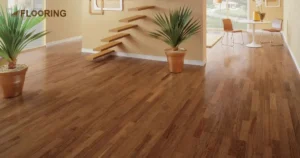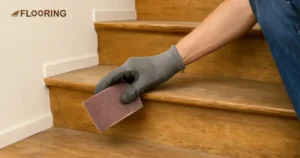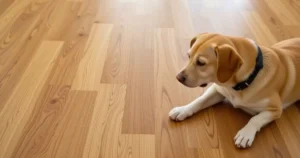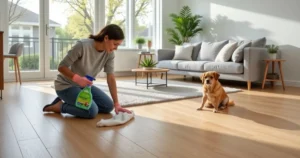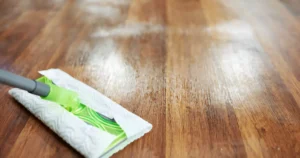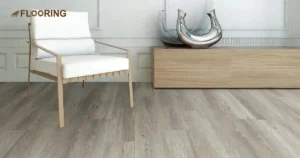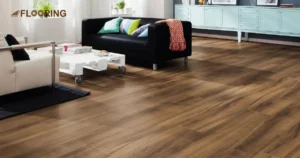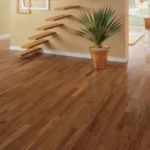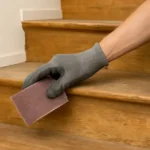Urine stains on hardwood floors can quickly turn a beautiful space into a nightmare. These stubborn stains not only mark the appearance of your flooring but also leave behind unpleasant odors. Getting urine stains out of hardwood floors requires swift action and the right techniques to prevent lasting damage.
Don’t let these accidents ruin your hardwood’s natural beauty. With the proper methods and tools, you can effectively remove urine stains from hardwood floors. This guide will walk you through proven strategies to tackle these stubborn marks and restore your floor’s pristine condition.
Key Takeaways
- Act quickly to get urine stains out of hardwood floors and prevent permanent damage.
- Use a mixture of vinegar and water as an effective solution to remove urine stains from hardwood floors.
- Enzymatic cleaners are specifically designed to get urine stains out of hardwood floors and eliminate odors.
- Regular maintenance and protective measures can prevent urine stains on hardwood floors.
- For stubborn stains, professional refinishing may be necessary to fully restore hardwood floors after removing urine stains.
Quick Solutions to Get Urine Stains Out of Hardwood Floors
When faced with urine stains on hardwood floors, time is of the essence. Get stains out of hardwood floors promptly by following these effective solutions.
- Blot immediately: Use paper towels or a clean cloth to absorb as much urine as possible. Avoid rubbing, as this can spread the stain.
- Neutralize odors: Mix equal parts water and white vinegar. Apply the solution to the affected area to neutralize odors and disinfect.
- Use hydrogen peroxide: For stubborn stains, apply a mixture of hydrogen peroxide and dish soap. Let it sit for a few minutes before wiping clean.
- Try baking soda: Sprinkle baking soda on the stain to absorb remaining moisture and odors. Vacuum after a few hours.
- Sand lightly: For set-in stains, gently sand the area with a fine-grit sandpaper. Be cautious not to damage the wood finish.
Essential Tools for Removing Urine Stains from Hardwood

Having the right tools on hand can make getting urine stains out of hardwood floors much easier. Stock up on these essentials to tackle stains effectively and protect your hardwood flooring.
- Absorbent materials: Keep microfiber cloths or paper towels readily available for quick blotting.
- Cleaning solutions: Stock white vinegar, hydrogen peroxide, and dish soap for making effective cleaning mixtures.
- Spray bottles: Use these to apply cleaning solutions evenly over the affected areas.
- Soft-bristled brush: Gently scrub stubborn stains without damaging the wood surface.
- Protective gear: Wear gloves to protect your hands from cleaning chemicals and urine.
- Fans or dehumidifiers: Use these to dry the area thoroughly after cleaning to prevent moisture damage.
- Fine-grit sandpaper: Keep this on hand for addressing set-in stains that may require light sanding.
Step-by-Step Guide to Get Urine Stains Out of Hardwood Floors
Follow this comprehensive guide to effectively remove urine stains from your hardwood floors. Each step is crucial in the process of getting urine stains out and preserving your floor’s integrity.
Step 1: Blot the area
- Use absorbent materials to soak up as much urine as possible.
- Press firmly but avoid rubbing to prevent spreading the stain.
Step 2: Clean with vinegar solution
- Mix equal parts water and white vinegar in a spray bottle.
- Apply the solution to the stained area and let it sit for 5 minutes.
- Wipe clean with a damp cloth.
Step 3: Apply hydrogen peroxide mixture
- For stubborn stains, mix 1/4 cup hydrogen peroxide with 1 teaspoon dish soap.
- Apply the mixture to the stain and let it sit for 15 minutes.
- Wipe clean with a damp cloth.
Step 4: Use baking soda
- Sprinkle baking soda over the cleaned area.
- Let it sit for several hours or overnight to absorb odors.
- Vacuum thoroughly.
Step 5: Sand if necessary
- For set-in stains, lightly sand the area with a fine-grit sandpaper.
- Be gentle to avoid damaging the wood finish.
- Wipe away dust with a damp cloth.
Step 6: Dry thoroughly
- Use fans or a dehumidifier to ensure the area is completely dry.
- This prevents moisture from seeping into the wood and causing further damage.
Natural Methods to Remove Urine Stains from Hardwood

Natural solutions can be effective in getting urine stains out of hardwood floors. These methods are safe for your floors and the environment. They use common household items to tackle stains and odors.
White vinegar is a powerful natural cleaner for urine stains on hardwood. Mix equal parts water and vinegar in a spray bottle. Apply this solution to the stained area and let it sit for 5 minutes. Wipe clean with a damp cloth. The acidity of vinegar helps neutralize urine odors and disinfect the area.
Another natural option is using baking soda to absorb odors and moisture. After cleaning the area, sprinkle baking soda liberally over the stain. Let it sit for several hours or overnight. For additional cleaning tips, learn how to mop a linoleum floor. Vacuum thoroughly to remove the baking soda. This method is particularly effective for lingering odors.
Commercial Products for Urine Stain Removal on Hardwood
When natural methods aren’t enough, commercial products can help get urine stains out of hardwood floors. These products are specifically formulated to tackle tough stains and odors. Choose a product suitable for your hardwood floor type.
| Product Type | How It Works | Best For |
| Enzymatic cleaners | Break down urine molecules to eliminate stains and odors | Stubborn, set-in stains and strong odors |
| Oxygenated cleaners | Use oxygen to lift stains and neutralize odors | Fresh urine stains and light discoloration |
| pH-neutral cleaners | Safely clean without damaging wood finish | Regular cleaning and maintenance of hardwood floors |
| Wood-specific stain removers | Formulated to remove stains while protecting wood | Various types of stains on hardwood surfaces |
Protective Measures for Hardwood Floors Against Urine
Prevention is key to maintaining the beauty of your hardwood floors. Implementing these protective measures can help prevent urine stains and make cleaning easier when accidents occur.
- Apply sealant: Use a high-quality wood sealant to create a protective barrier against urine penetration.
- Use area rugs: Place washable rugs in high-traffic areas or where pets frequently stay.
- Regular cleaning: Maintain a consistent cleaning schedule to prevent buildup of dirt and stains.
- Quick response: Address spills and accidents immediately to prevent staining and odor absorption.
- Pet training: For pet owners, consistent house training can significantly reduce accidents on hardwood floors.
- Moisture barriers: Install moisture barriers under area rugs to prevent urine from seeping through to the wood.
- Regular inspections: Conduct routine checks of your hardwood floors to catch and address any issues early.
Restoring Hardwood Floors After Removing Urine Stains
After successfully removing urine stains, your hardwood floor may need some restoration. This process can help bring back the floor’s original luster and protect it from future damage. It’s important to address any lingering issues to maintain the floor’s integrity.
Start by thoroughly cleaning the entire floor to ensure uniformity. Use a pH-neutral cleaner designed for hardwood. Once clean and dry, assess the need for refinishing. Light sanding may be necessary to smooth out any raised grain caused by moisture. Apply a new coat of finish to protect the wood and restore its shine. This process can also help remove water stains on hardwood floors that may have occurred during the cleaning process.
For severe damage, professional refinishing might be necessary. This involves sanding down the entire floor to remove all stains and damage. A new stain and finish are then applied. While more intensive, this process can make your hardwood floors look like new, erasing all signs of urine stains and other damage.
Frequently Asked Questions
Can pet urine permanently damage hardwood floors?
Yes, pet urine can permanently damage hardwood floors if not cleaned promptly. The acidity in urine can eat through the floor’s finish and stain the wood. Quick action to get urine stains out of hardwood floors is crucial to prevent lasting damage.
How long does it take to get urine stains out of hardwood floors?
The time to get urine stains out of hardwood floors varies depending on the stain’s age and severity. Fresh stains can often be removed within an hour, while older stains may take several days of treatment.
Can I use bleach to get urine stains out of hardwood floors?
Bleach is not recommended to get urine stains out of hardwood floors. It can damage the wood’s finish and color. Stick to pH-neutral cleaners or vinegar solutions specifically designed for hardwood.
Will getting urine stains out of hardwood floors also eliminate the odor?
Properly cleaning urine stains from hardwood floors often eliminates the odor. However, for persistent smells, additional deodorizing treatments may be necessary after removing the stain.
How often should I seal my hardwood floors to prevent urine stains?
Sealing hardwood floors every 3-5 years can help prevent urine stains. Regular maintenance and prompt cleaning are also crucial to getting urine stains out of hardwood floors and maintaining their integrity.
Can I use a steam cleaner on linoleum floors to remove urine stains?
Steam cleaners are not recommended for linoleum floors as they can cause damage. To get urine stains out of linoleum, use a pH-neutral cleaner and avoid excess moisture, which can seep under the flooring.
Are there any home remedies to get old urine stains out of hardwood floors?
Yes, a mixture of hydrogen peroxide and dish soap can help get old urine stains out of hardwood floors. Apply the solution, let it sit for 10-15 minutes, then wipe clean. Always test on a small, inconspicuous area first.

